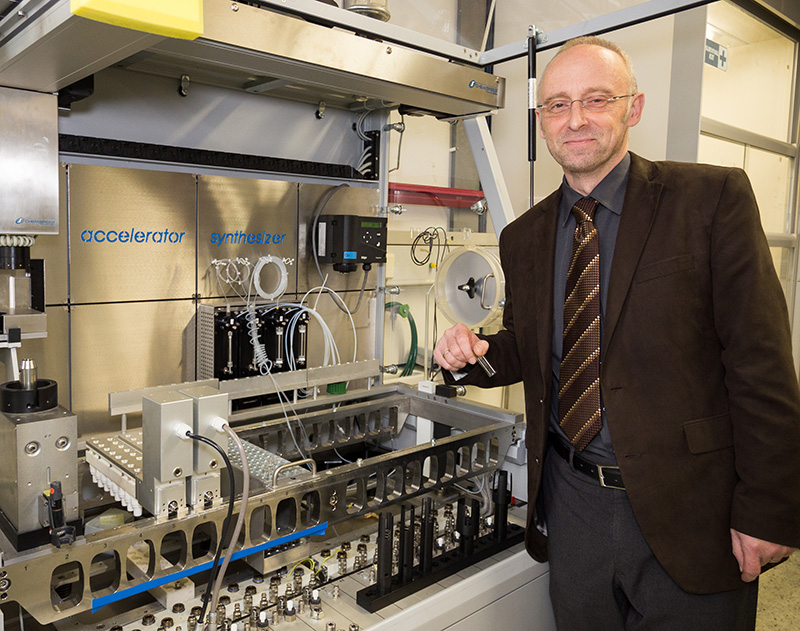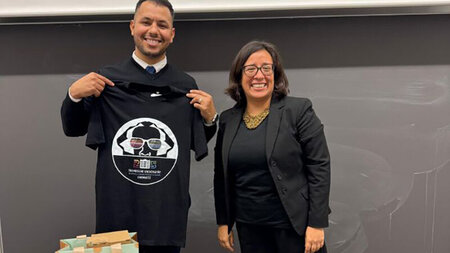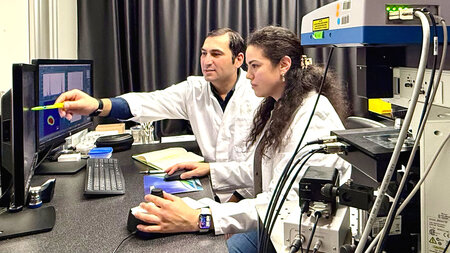Between Classical Chemistry and Chemical Engineering
Eleven questions addressed to Prof. Dr. Klaus Stöwe, who holds the Professorship of Chemical Technologies since April 2014
-

"Especially here in Chemnitz, the chemical technology should be understood as a process of material production", says Prof. Dr. Klaus Stöwe. To the equipment of his professorship belongs a Chemspeed Accelerator SLT 109 Robotic Parallel Synthesizer, which is used for parallel and automated execution of complex synthesis steps in the manufacture of chemical compounds and materials. Photo: Steve Conrad
Prof. Dr. Klaus Stöwe (52) holds the Professorship of Chemical Technologies at the Faculty of Natural Sciences since April 2014. In eleven answers, he gives the readers of “University News“ an insight into his career, goals and time in Chemnitz.
What do we actually understand under “chemical technologies“?
Chemical technologies stand between the classical chemistry and chemical engineering. Especially here in Chemnitz, the chemical technology should be understood as a process of material production. Starting from the idea through the basic research up to applied research, the competence of professorship should lie in the field of functional materials within a wide area of application. Thus, the professorship has a role as a bridge between both, different disciplines and the principles and applications of functional materials.
TU Chemnitz is for me as a professor the right choice, because…
… it represents a network with many opportunities and skills.
Could you say a few words about your academic career?
I studied Chemistry at the University Erlangen-Nuremberg, where I also did my doctorate in 1990. I worked at the University of Saarland afterwards. Then I hosted at the University of Oregon in the United States and at the Max-Planck-Institute for Solid State Research in Stuttgart. Since January 2007, I was an adjunct professor at the University of Saarland, where I became an Academic Director in the field of Technical Chemistry in November 2010. In the period from November 2012 to March 2014, I held the vacancy representation for the Professorship of Technical Materials Chemistry in Saarbrücken.
Describe your study time in no more than 15 words.
Completely overcrowded lecture halls and internships, but much more study freedom than today.
Did you have role models during your studies who encouraged you to pursue a scientific career?
The physicists Werner Heisenberg and Paul Dirac, who already at an early age formulated revolutionary theory and have been honored with the Nobel Prizes.
What advice would you give to young students and graduates?
To take the time before starting their studies, to be clear about their future career goal and if possible, reconsider their ideas by completing an internship.
What would you like to achieve in teaching for the future?
Give our students a proper basic education in Chemical Technology, to convince them of the need for intensive experimental design and prepare them for their later contact with high-throughput technologies in the industry.
Which impact do you make in the research at TU Chemnitz?
For instance, in the development of highly energy-efficient chemical production processes for materials, or the application of more effective parallel characterization methods for materials.
There are around 45.000 professors at German universities. What sets you apart from others?
The use of high-throughput technologies for the discovery and optimization of materials and the development of high-throughput experimental modules for internships at universities.
Which place do you show your guests the most in Chemnitz?
The Villa Esche or the Gunzenhauser Museum.
How do you play a part in the life of the city?
By means of external funds I create jobs in Chemnitz.
Further information about professorship at: https://www.tu-chemnitz.de/chemie/tech/
(Translation: Nataliia Boiko)
Katharina Thehos
04.12.2014




